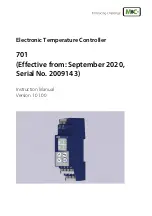
Page 3
4. WIRING THE AC INPUT
Refer to wiring diagram on Page 4 for the proper wiring configuration of the
ETS
. For wiring diagrams not
shown, consult Customer Service.
OPERATION
Normal Mode
–
AC power is present. The AC driver or ballast operates the lamp(s) as intended. The closed
dimming relay of the ETS-DR allows operation of the luminaire at the desired setting of the connected dim-
ming signal.
Emergency Mode
–
Failure of normal AC (utility) power. The
ETS-DR
senses the AC power failure and auto-
matically bypasses the wall switch with an internal relay controlling the AC Driver/Ballast, ensuring the flow of
emergency power to the controlled emergency lighting load regardless of the wall switch’s “on” / “off” state. The
ETS-DR
Dimming Relay contacts electrically open the 0-10 volt dimming signal, forcing the emergency lighting
load to operate at full lumen output regardless of the dimmer setting. The emergency lighting load is illumi-
nated at full light output for as long as auxiliary power is available. When the AC power is restored, the
ETS-DR
returns to the
Normal Mode of operation
. See page 1 of the Instruction Manual.
TESTING & MAINTENANCE
The
ETS-DR
is a maintenance free unit, however, periodic inspection and testing is required. NFPA 101, Life
Safety Code, outlines the following schedule:
Insure that the
AC Indicator
light is illuminated monthly.
“Written records of testing shall be kept by the owner for inspection by the authority having jurisdiction.”
SERVICING SHOULD BE PERFORMED BY QUALIFIED PERSONNEL.
Consult Customer Service or visit www.iotaengineering.com for current warranty information.






















